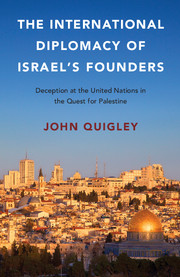 The International Diplomacy of Israel's Founders
The International Diplomacy of Israel's Founders Book contents
- Frontmatter
- Contents
- Preface
- A Note on United Nations Committees
- Abbreviations
- 1 A Public Relations Imperative
- 2 Promises, Promises
- 3 Pranks in Paris and Geneva
- 4 Courting the Commissar
- 5 Saving Europe's Jews – Our Way
- 6 Smoke and Mirrors at the YMCA
- 7 The Ship that Launched a Nation
- 8 Cocktails at the Consulate
- 9 Causing Chaos
- 10 Denying the Undeniable
- 11 A Peace-Loving State?
- 12 Joining the World with Fingers Crossed
- 13 Israel: 1, United Nations: 0
- 14 A Phantom Attack
- 15 Sabras in Sinai: Pardon My French
- 16 Suez Smoke-Screen
- 17 Mr. Nasser, Please Attack
- 18 Abba Eban's Finest Hour
- 19 Old Issues, New Lies
- 20 An Organization Turned Sinister
- 21 Prevarication Pays
- Notes
- Bibliography
- Index
10 - Denying the Undeniable
Published online by Cambridge University Press: 05 January 2016
- Frontmatter
- Contents
- Preface
- A Note on United Nations Committees
- Abbreviations
- 1 A Public Relations Imperative
- 2 Promises, Promises
- 3 Pranks in Paris and Geneva
- 4 Courting the Commissar
- 5 Saving Europe's Jews – Our Way
- 6 Smoke and Mirrors at the YMCA
- 7 The Ship that Launched a Nation
- 8 Cocktails at the Consulate
- 9 Causing Chaos
- 10 Denying the Undeniable
- 11 A Peace-Loving State?
- 12 Joining the World with Fingers Crossed
- 13 Israel: 1, United Nations: 0
- 14 A Phantom Attack
- 15 Sabras in Sinai: Pardon My French
- 16 Suez Smoke-Screen
- 17 Mr. Nasser, Please Attack
- 18 Abba Eban's Finest Hour
- 19 Old Issues, New Lies
- 20 An Organization Turned Sinister
- 21 Prevarication Pays
- Notes
- Bibliography
- Index
Summary
The United Nations remained in the picture, but, having given up first on partition, and now on trusteeship, it would assume a reduced role. The Jewish Agency, now operating as the State of Israel, benefited from disinclination on the part of the major powers for any on-the-ground involvement that might have stemmed the expulsions. On May 15, 1948, the first day after the declaration of Jewish statehood, military forces of the Arab League entered Palestine, vowing to stop the expulsions and to restore order. Egypt's foreign minister justified the Arab League troop entry in a statement to the Security Council. “The Royal Egyptian Government declare, now that the British Mandate in Palestine has ended, that Egyptian armed forces have started to enter Palestine to establish security and order in place of chaos and disorder which prevailed and which rendered the country at the mercy of Zionist terrorist gangs who persisted in attacking the peaceful Arab inhabitants, with arms and equipments amassed by them for that purpose.” The foreign minister elaborated. “Horrible crimes, revolting to the conscience of humanity, have been perpetrated by these Zionist gangs.” Invoking the concept that had been used at the Nuremberg trials in Germany, he called these acts “crimes against humanity” and said that it was Egypt's duty “as a Government of an Arab State and a civilized nation to intervene in Palestine with the object of putting an end to the massacres raging there and upholding law and principles recognized among the United Nations.” He said that the troop intervention “has no other object in view except the restoration of security and order to Palestine particularly after the British Mandate has ended, and until a just and equitable solution is reached.”
China, as a Security Council member, found the Egyptian analysis persuasive. On the day after the declaration of Jewish statehood, China challenged the Jewish Agency, blaming it for a breakdown of order in Palestine. In a reference to the efforts toward establishing a trusteeship, China criticized the statehood declaration, saying, “The prompt proclamation of the Jewish state last evening reduced considerably the prospects of peace in Palestine.”
Shabtai Rosenne was the Jewish Agency's chief lawyer. Rosenne, writing some years later, derided the Arab League explanation for its entry into Palestine.
- Type
- Chapter
- Information
- The International Diplomacy of Israel's FoundersDeception at the United Nations in the Quest for Palestine, pp. 92 - 104Publisher: Cambridge University PressPrint publication year: 2016
